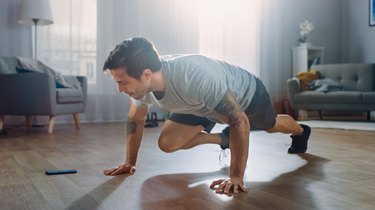
Love it or hate it, excess belly fat gets a lot of attention. But instead of promoting body acceptance or lifestyle changes to help you find your healthy weight — which is the weight where you feel your best, no matter your body size — some claim a heating pad (and similar treatments) can burn fat.
So, do heating pads or wraps on your stomach and certain new non-invasive heat treatments actually burn belly fat and help you lose weight? Well, sort of — but not for everyone and maybe not for the long run, either.
Video of the Day
Video of the Day
Confused? Below, learn about the different heat products and technologies out there, whether they can lead to weight loss and healthier ways to lose fat if that's your goal.
Tip
In general, there's little evidence that products like heating pads or stomach heat wraps can help burn fat. Heat technologies like laser or radiofrequency treatments may reduce some fat, but more research is needed to better establish these results and their long-term effects.
Can a Heating Pad Burn Fat?
Manufacturers of widely marketed heated pads, belts and wraps claim the products' increased temperature and/or electrical currents target belly fat and result in weight loss in the mid-section, leaving you with a six-pack. (Does this sound too good to be true, yet?) But in reality, there's little evidence that a heating pad or heat belt or wrap can actually burn fat.
"There is no solid data that shows that any of the heating products change fat mass at all," obesity medicine and nutrition doctor Fatima Cody Stanford, MD, MPH, tells LIVESTRONG.com.
"They're appealing because in the short term, they do appear to have some affect [from] shrinking the water content within fat cells, but it comes right back. I do not recommend these strategies for any of my patients because the data is so scarce."
For instance, one of the few pieces of research about these wearables is a small October 2013 study of 19 people assigned female at birth, which found that a combination of plaster stomach wraps and aerobic exercise contributed to more belly fat loss than exercise alone, per Integrative Medicine Research.
However, more studies in larger groups of people are needed to better establish this link. And in the case of this study, Dr. Stanford notes that the wrap wasn't the sole factor that contributed to weight loss — exercise and sweat loss under the wrap played a role.
There's similarly scant evidence for electric muscle stimulators (EMS), which send electrical currents to the stomach muscles to make them contract. Though these devices may actually strengthen your core, per the U.S Food and Drug Administration (FDA), they are not cleared for weight loss or for getting sculpted abs.
Warning
Not all of these products are FDA-approved, so there’s no guarantee that any tool you try is safe or effective. The same goes for home remedies, like using a heating pad or hot-water bag to reduce belly fat.
Can Novel Heat Technology Destroy Fat?
Besides those over-the-counter products and devices, there are also non-surgical heat treatments done in a medical office that may have more promise "melting" belly fat than using a heating pad, belly wrap or belt to lose weight.
Per a July 2016 review in the International Journal of Endocrinology and Metabolism, heat technologies include:
- Radiofrequency treatments like Vanquish, which use frequency to heat and destroy fat, typically over the course of a month, per the American Society of Plastic Surgeons (ASPS).
- Low-level laser thermal therapies like SculpSure, which use an applicator to heat and destroy fat cells with laser energy for weight loss over the course of a few months, per the ASPS.
- High-intensity focused ultrasound (HIFU), which heats up fat to cause cell death.
That same review found that these technologies reduced unwanted fat. However, the reduction wasn't very significant — it amounted to about 2 to 4 centimeters of fat loss.
What's more, heat treatments like these are relatively new technologies, so more time and research is needed to understand their effects in the long term, according to a January 2015 review of HIFU in Research and Reports in Focused Ultrasound.
And whether or not these technologies lead to permanent results is up for debate. On one hand, you have a set number of fat cells, and killing some of them with these treatments may leave you with fewer overall, per the American Academy of Dermatology Association.
But Dr. Stanford says that these novel heat technologies don't actually destroy fat cells. "Fat cells don't really go away — once they're there, they're there. They can shrink and expand, but they don't go anywhere," she says.
Side Effects of Common Heat Treatments
Per the ASPS, side effects for the FDA-approved Vanquish and SculpSure treatments may include:
- Redness
- Swelling
- Tenderness
It's also important to note that these heat technologies are meant for spot reduction in people who don't have overweight, per the ASPS, rather than dramatic fat loss. If your goal is to lose a lot of weight, it's best to stick with natural weight-loss methods like changes to your diet and exercise.
4 Better Ways to Burn Belly Fat
Given that there isn't solid evidence that heat treatments destroy fat for good, Dr. Stanford says that quick fixes like these aren't the answer.
If losing belly weight is your goal, the best way to go about it is to make the lifestyle changes below to lose fat from all over your body, including your abdomen.
1. Tweak Your Eating Habits
Cutting calories and eating whole foods is a major factor in finding your healthy weight.
If you're having trouble deciding what to eat, consider going the Mediterranean route. The Mediterranean diet is low in refined carbs, sugar and saturated and trans fats and rich in lean protein, fruits, veggies, whole grains, fiber and healthy fats, according to the American College of Cardiology.
How Many Calories Should You Cut for Weight Loss?
One pound of stored fat contains approximately 3,500 calories, according to the Mayo Clinic, so experts typically recommend cutting 500 to 1,000 calories per day to lose weight at a safe and sustainable pace of 1 to 2 pounds per week.
2. Try HIIT
Any type of cardio workout burns calories, but high-intensity interval training (HIIT) is one of the most effective for fat loss. This type of training alternates periods of intense activity with short recovery periods, per the American College of Sports Medicine.
HIIT has been shown to improve overall body composition, and it's also a time-efficient way to reduce fat, according to a February 2018 review in Sports Medicine.
3. Get Enough Sleep
Sleep deprivation can get in the way of finding or maintaining your healthy weight, according to the Sleep Foundation. That's because feeling tired can change your levels of certain appetite-regulating hormones, which may lead to less activity and more eating (often processed snacks), per an August 2014 review in Annals of Medicine.
The fix: Get enough shut-eye. And make sure the sleep you do get is quality, by practicing good sleep hygiene, such as:
- Having a consistent sleep schedule
- Sleeping in a dark, cool and quiet room
- Trying relaxation techniques like journaling or reading to help you wind down before bed
4. Manage Stress
Your stress levels are also linked to body fat, per the American Institute of Stress. Like sleep deprivation, the hormones associated with high stress levels can influence you to eat more processed foods and, in turn, increase fat, according to October 2014 research in Minerva Endocrinology.
Self-care and the following strategies may help you manage your stress levels:
- Get regular exercise
- Try breathing exercises
- Practice mindfulness
- International Journal of Endocrinology and Metabolism: "Review of the Mechanisms and Effects of Noninvasive Body Contouring Devices on Cellulite and Subcutaneous Fat"
- Research and Reports in Focused Ultrasound: "High-intensity focused ultrasound for noninvasive body contouring: current perspectives"
- American Academy of Dermatology Association: "Non-invasive fat removal: What can you expect?"
- American Society of Plastic Surgeons: "What is radiofrequency lipolysis?"
- American Society of Plastic Surgeons: "What is laser lipolysis?"
- Mayo Clinic: "Why do doctors recommend a slow rate of weight loss? What's wrong with fast weight loss?"
- American College of Cardiology: "Mediterranean Diet Promotes Weight Loss Despite High Fat Content"
- Sports Medicine: "Effect of High-Intensity Interval Training on Total, Abdominal and Visceral Fat Mass: A Meta-Analysis"
- American College of Sports Medicine: "High-Intensity Interval Training"
- Annals of Medicine: "Sleep debt and obesity"
- Sleep Foundation: "Diet and Exercise and Sleep"
- Integrative Medicine Research: "Plaster body wrap: effects on abdominal fat"
- U.S Food and Drug Administration: "Electronic Muscle Stimulators"
- American Institute of Stress: "Stress, Cortisol, and Abdominal Fat"
- Minerva Endocrinology: "Stress and Eating Behaviors"
- Fatima Cody Stanford, MD, MPH, MPA, MBA, FAAP, FACP, FAHA, FAMWA, FTOS
- Integrative Medicine Research: "Plaster Body Wrap: Effects on Abdominal Fat"
- U.S Food and Drug Administration: "Electronic Muscle Stimulators"
- Journal of Endocrinology and Metabolism,: "Review of the Mechanisms and Effects of Noninvasive Body Contouring Devices on Cellulite and Subcutaneous Fat"
- Journal of Cosmetic Dermatology: "Effects of Radiofrequency on Adipose Tissue: A Systematic Review With Meta-Analysis
- American Academy of Dermatology Association: "Non-Invasive Fat Removal: What Can You Expect?"
- American Society of Plastic Surgeons: "What is Nonsurgical Fat Reduction?"
- American Society of Plastic Surgeons: "What is Radiofrequency Lipolysis?"
- American Society of Plastic Surgeons: "What is Laser Lipolysis?"
- American College of Cardiology: "Mediterranean Diet Promotes Weight Loss Despite High Fat Content"
- Mayo Clinic: "Why Do Doctors Recommend a Slow Rate of Weight Loss? What's Wrong with Fast Weight Loss?"
- American College of Sports Medicine: "High Intensity Interval Training"
- Sports Medicine: "Effect of High-Intensity Interval Training on Total, Abdominal and Visceral Fat Mass: A Meta-Analysis"
- Annals of Medicine: "Sleep Debt and Obesity"
- The American Institute of Stress: "Stress, Cortisol and Abdominal Fat"



